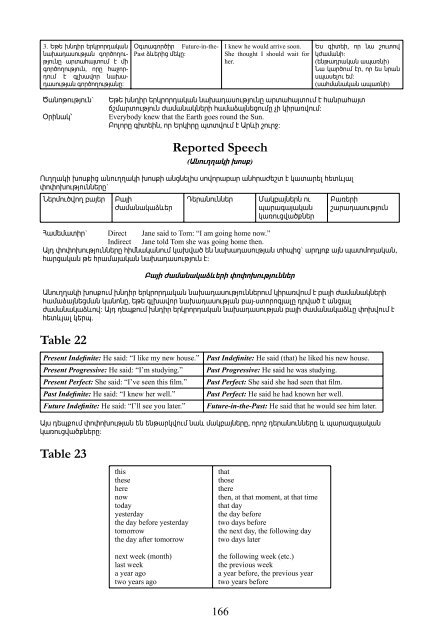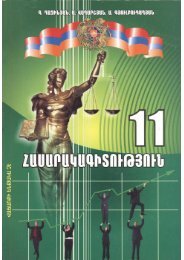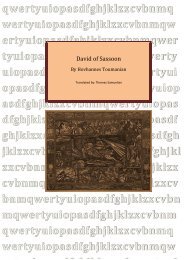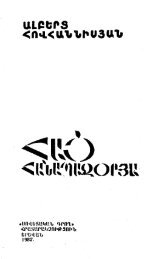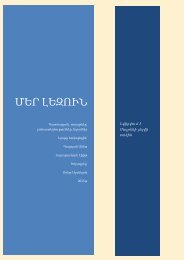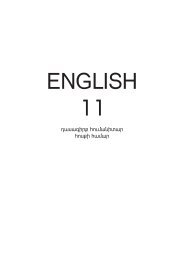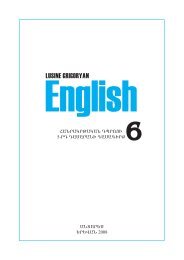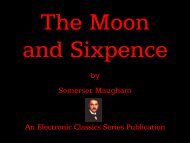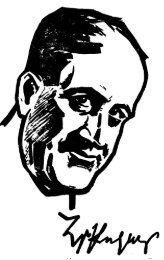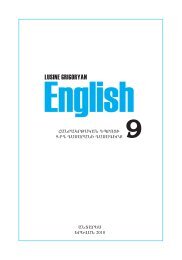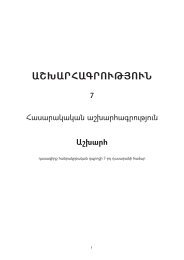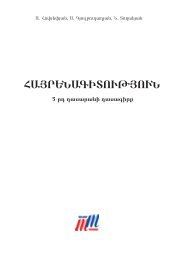Focus on Words
Focus on Words
Focus on Words
You also want an ePaper? Increase the reach of your titles
YUMPU automatically turns print PDFs into web optimized ePapers that Google loves.
3. Եթե խնդիր երկրորդական<br />
նախադասության գործողությունը<br />
արտահայտում է մի<br />
գործողու թյուն, որը հաջորդում<br />
է գլխավոր նախադասության<br />
գործողությանը:<br />
Օգտագործիր Future-in-the-<br />
Past ձևերից մեկը:<br />
I knew he would arrive so<strong>on</strong>.<br />
She thought I should wait for<br />
her.<br />
Ես գիտեի, որ նա շուտով<br />
կժամանի:<br />
(ենթադրական ապառնի)<br />
Նա կարծում էր, որ ես նրան<br />
սպասելու եմ:<br />
(սահմանական ապառնի)<br />
Ծանոթություն`<br />
Օրինակ՝<br />
Եթե խնդիր երկրորդական նախադասությունը արտահայտում է հանրահայտ<br />
ճշմարտություն ժամանակների համաձայնեցումը չի կիրառվում:<br />
Everybody knew that the Earth goes round the Sun.<br />
Բոլորը գիտեին, որ Երկիրը պտտվում է Արևի շուրջ:<br />
Reported Speech<br />
(Անուղղակի խոսք)<br />
Ուղղակի խոսքից անուղղակի խոսքի անցնելիս սովորաբար անհրաժեշտ է կատարել հետևյալ<br />
փոփոխությունները`<br />
Ներմուծվող բայեր<br />
Բայի<br />
ժամանակաձևեր<br />
Դերանուններ<br />
Մակբայներն ու<br />
պարագայական<br />
կառուցվածքներ<br />
Բառերի<br />
շարադասու թյուն<br />
Համեմատիր` Direct Jane said to Tom: “I am going home now.”<br />
Indirect Jane told Tom she was going home then.<br />
Այդ փոփոխությունները հիմնականում կախված են նախադասության տիպից` արդյոք այն պատմողական,<br />
հարցական թե հրամայական նախադասություն է:<br />
Բայի ժամանակաձևերի փոփոխություններ<br />
Անուղղակի խոսքում խնդիր երկրորդական նախադասություններում կիրառվում է բայի ժամանակների<br />
համաձայնեցման կանոնը, եթե գլխավոր նախադասության բայ-ստորոգյալը դրված է անցյալ<br />
ժամանակաձևով: Այդ դեպքում խնդիր երկրորդական նախադասության բայի ժամանակաձևը փոխվում է<br />
հետևյալ կերպ.<br />
Table 22<br />
Present Indefinite: He said: “I like my new house.”<br />
Present Progressive: He said: “I’m studying.”<br />
Present Perfect: She said: “I’ve seen this film.”<br />
Past Indefinite: He said: “I knew her well.”<br />
Future Indefinite: He said: “I’ll see you later.”<br />
Past Indefinite: He said (that) he liked his new house.<br />
Past Progressive: He said he was studying.<br />
Past Perfect: She said she had seen that film.<br />
Past Perfect: He said he had known her well.<br />
Future-in-the-Past: He said that he would see him later.<br />
Այս դեպքում փոփոխության են ենթարկվում նաև մակբայները, որոշ դերանունները և պարագայական<br />
կառուցվածքները:<br />
Table 23<br />
this<br />
these<br />
here<br />
now<br />
today<br />
yesterday<br />
the day before yesterday<br />
tomorrow<br />
the day after tomorrow<br />
next week (m<strong>on</strong>th)<br />
last week<br />
a year ago<br />
two years ago<br />
that<br />
those<br />
there<br />
then, at that moment, at that time<br />
that day<br />
the day before<br />
two days before<br />
the next day, the following day<br />
two days later<br />
the following week (etc.)<br />
the previous week<br />
a year before, the previous year<br />
two years before<br />
166


